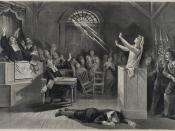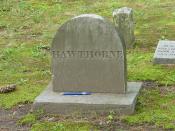In the introductory sketch to Nathaniel Hawthorne's novel the 'The Scarlet Letter', the reader is informed that one of the author's ancestors persecuted the Quakers harshly. The latter's son was a high judge in the Salem witch trials, put into literary form in Arthur Miller's 'The Crucible' (Judge Hathorne appears there). We learn that Hawthorne feels ashamed for their deeds, and that he sees his ancestors and the Puritan society as a whole with critical eyes. Consequently, both open and subtle criticism of the Puritans' practices is applied throughout the novel.
Hawthorne's comments have to be regarded in the context of the settlers' history and religion. They believe that man is a creature steeped in sin, ever since Adam and Eve's fall from innocence. To them, committing the original sin strapped human beings of their own free will, so that God now decides about their lives. Everything that happens is seen as God's will, and providence plays an important role.
Through the sacrifice and righteousness of Christ, however, there is a chance for people to be saved. One cannot definitely know who will be saved, although pious and faithful people are of course more likely to. The experience of conversion, in which the soul is touched by the Holy Spirit, so that the believer's heart is turned from sinfulness to holiness, is another indication that one is of the elect. Faithfulness and piety, rather than good deeds are what saves people. If someone has sinned, public confession is believed to take some of the burden of this sin off him.
The initial reason for the Puritans to leave their homes was the treatment they had to suffer from in their native England. They were brutally persecuted and were not allowed to practise their religion, because they said that the...


